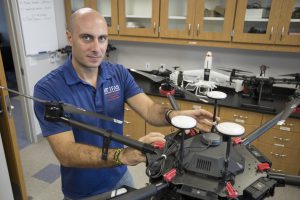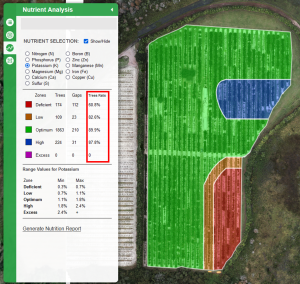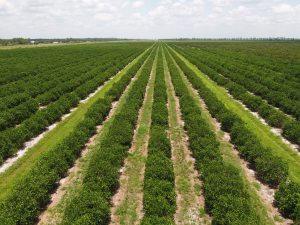Mechatronics, artificial intelligence, machine vision, smart machines, unmanned aerial vehicles – if this sounds like something out of the latest sci-fi epic, think again – this is the new agriculture, and Dr. Yiannis Ampatzidis is harnessing these cutting edge technologies and making them available to agricultural producers.
The story starts in Florida, in a small community called Immokalee in southwest Florida’s Collier County. Far from South Beach, far from Florida’s crowded attractions, Immokalee is located in a lesser-known Florida that is densely agricultural, and one of the top tomato-producing regions in the U.S., supplying up to 90% of winter tomatoes for the nation. Immokalee is also home to IFAS’s Southwest Research and Education Center, one of 12 such centers across the state.
As far as Dr. Ampatzidis is from his native Greece, his career in agricultural engineering and his focus on precision agriculture and automation for specialty crops makes him right at home in Immokalee, and this is where he develops the many innovations he’s already known for in his five years with IFAS.
Here, among tens of thousands of acres dedicated to the production of citrus, tomatoes, watermelon, nursery plants, and many other commodities, Dr. Ampatzidis perfects high-tech methods that aid agricultural producers in optimizing their use of land and more efficiently managing their crops. The bottom line is better yields and higher standards of living for the region.
When asked what all this technology has to do with agriculture, Dr. Ampatzidis says that we are now living in data-driven era and that data is our number one asset for improving agriculture for consumers, producers, and the environment. Precision agriculture is a higher level of agricultural management that uses data to optimize “inputs, resources, and products.” This means maximizing production with precisely tuned levels of fertilizers and water – the key to accomplishing this is good data.

Where does this data come from? This is where Dr. Ampatzidis comes in. He brings together data from sensors carried by unmanned aerial vehicles (UAVs; or drones) or satellites or based on the ground. The sensors use a combination of imagery visible to the human eye and multispectral imagery, which goes far beyond human vision to reveal many other aspects of plant health. These data are fed into a software application called Agroview which processes the data and uses artificial intelligence to evaluate plant health, plant stress, and disease status more efficiently than was possible before. An additional software tool is a type of artificial intelligence called machine learning, which allows Agroview to get better at spotting disease – in other words, the software learns from experience, which increases its precision and efficiency.
Agroview displays the resulting information on high-resolution maps that allow producers to use a familiar tool to see their fields in new, high-tech ways. These maps can also be used by ”smart” machines to apply chemicals with great precision.
What is this data? It is plant counts, plant volumes, stress detection, and even disease detection, often at a plant-by-plant level. Data can give producers precise information about where water is needed, where plants are underperforming and need extra attention, or where certain diseases are beginning to appear. The amount of data is vast, but Agroview makes it accessible so that producers can manage hundreds or thousands of acres with the same attention to detail that they might use in a kitchen garden outside their back door.

The importance of Agroview was acknowledged shortly after its release in 2020 with the Invention of the Year Award from UF Innovate, the organization that oversees the development of all technology with commercial potential at UF. In 2021, Agroview was acknowledged on the national stage when the American Society of Agricultural and Biological Engineers (ASABE) named Agroview a winner of a 2021 “AE50” award, in which ASABE honors up to 50 of the “year’s most innovative designs in engineering products or systems for the food and agriculture industries,” selecting from entries submitted by companies all over the world.
Matt Donovan, CEO of Agriculture Intelligence, Inc., in Gainesville, Fla., worked with Dr. Ampatzidis during development of the Agroview system and is a principal in the commercialization of the system. In response to the AE50 award, Mr. Donovan said, “Dr. Ampatzidis’s breakthrough work in artificial intelligence and machine vision, as well as a focus on full automation in the cloud, really sets the Agroview platform as the standard for plant and gaps counting, plant stress detection and management, and full-field nutrient analysis.”
An exciting aspect of Agroview is the many ways it can be developed to increase yields and reduce environmental impacts. Dr. Ampaizidis is currently exploring enhancements and extensions of Agroview. Using Agroview’s powerful imaging and detection technologies, areas with issues like lower yields, specific nutrient deficiencies, pests, or disease can be detected, and fertilizers or herbicides applied to only those areas instead of the whole field.
Dr. Ampatzidis illustrates the power of this precision agriculture approach with a tomato field that has been treated for weeds before planting, but during the growth period, drone-based detectors find 20% of the zones have weeds. It’s an easy calculation to understand that if only this 20% of the field is treated, then 80% of the chemical that would be used for the whole field has been saved. This means less expense and more yield for the producer and much less chemical introduced into the environment.
Dr. Ampatzidis describes other methods that are begin developing currently, including an approach to the fruit drop problem in Florida’s citrus industry. This is a big problem, with perhaps 30% of fruit being lost due to citrus greening. Here again, data collected by ground farm machinery and drones that can image some of the fruit on a citrus tree can be used by Agroview to detect yield losses on a tree-by-tree basis and treatment for greening can be targeted for affected trees. Where trees have been culled due to citrus greening, Agroview can be used to guide sprayers to apply fertilizers only to trees based on their needs. So Agorview can help prevent greening losses, but when they occur, it can also help compensate for them.

There are many other creative applications of this technology being explored by Dr. Ampatzidis and his research team. As these techniques are refined, they will make a significant impact on yields, profitability of operations, and environmental impacts.
We started in a rural corner of Florida and graduate to a national award, but technology like Agroview also has global applications. This type of management tool is important to producers who are at the mercy of weather and fluctuating markets. Every aspect of their operation, especially keeping their plants healthy while minimizing costs, is critical to their success.
The need to improve yields and manage the use of resources while protecting the environment is an important goal for producers. As the world population continues to grow, agriculture has to stay ahead of the curve in its efforts to provide a stable food supply. Governments around the world are promoting precision agriculture through special initiatives, and the demand for precision agriculture tools like Agroview is expected to grow steadily over the foreseeable future.
Agroview is already making a difference in Florida agriculture, but stay tuned as the user base grows nationally and internationally.
That’s UF ABE: Big Questions, Global Reach.
This article was written by: Charles Brown and Yiannis Ampatzidis
 3
3

